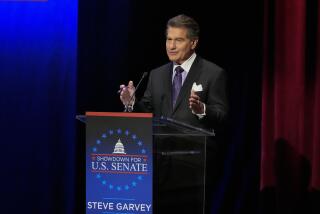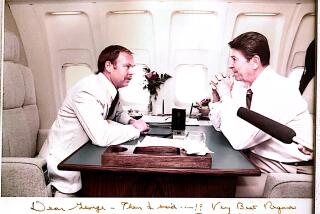An exit interview with Rep. David Dreier
David Dreier was 26, still living in a dorm at Claremont McKenna College and working as a college administrator, when he ran for Congress the first time, in 1978. He lost then but never thereafter. Sixteen times, Dreier was elected to the House of Representatives from a San Gabriel Valley/San Bernardino County district. He became the youngest-ever chairman of the Rules Committee, mastering the machinery of the House. But in February, he announced he would not seek reelection. He leaves behind a sharply redrawn district, and a Congress he insists is not so awfully different from the one he entered more than half his life ago.
You went to Washington in the “Ronald Reagan Class of 1980.” Pundits have said even Reagan wouldn’t manage in today’s political climate.
I joke that Reagan could not win the Republican nomination and John F. Kennedy could not win the Democratic nomination. When I made my [retirement] announcement, I said this institution is as great as it’s ever been. That led everyone to scratch their heads. The institution is reflective of society and the body politic. We have a very divided America; that being represented in Congress does not diminish it, even though it has a 10% approval rating — lower than Moammar Kadafi’s, from the people who killed him! The attention is always on areas of disagreement, but that doesn’t mean there aren’t a lot of things getting done reasonably well.
Other departing Republicans, such as Sens. Olympia Snowe and Richard Lugar, deplore the level of hostility and lack of nuance in Washington.
I don’t look at the world through rose-colored glasses. Is it not human nature to talk about the “good old days”? I heard people [in Congress] saying that in the early ‘80s. I just don’t buy it.
Then where does the partisanship leave you, as a known moderate?
I know I’m labeled that, but when I got here I was labeled a Reagan robot. I like to get things done and find areas of agreement. That doesn’t mean I’m not a proponent of James Madison’s clash of ideas, but you’ve got to get things done. That means you’re compromising, which some see as a negative. You should never compromise your principles, but you should always be prepared to compromise for principle.
Your moderation reportedly cost you the House speakership.
There were people who wanted me to be speaker, and I said I just want to be chairman of the Rules Committee. This committee is the traffic cop through which virtually everything has to go before it’s considered on the House floor. It’s just an amazing honor.
A group of members, Democrats and Republicans, have said to me, “This place isn’t going to be able to function without you.” I was reminded of Charles de Gaulle’s famous line that the cemetery is filled with indispensable people.
Wasn’t there talk of you becoming head of the Motion Picture Assn. of America?
In 2004, I was approached by studio heads. I’m so grateful I [said no]. The things I wanted to accomplish —reverse the 82% non-defense discretionary spending, the Panama, Colombia and South Korea free-trade agreements I’d worked on for a decade, and opening the [legislative] process to make sure Democrats as well as Republicans have their ideas considered. [L.A. Democratic Rep.] Maxine Waters has said to me, “You’ve handed me more opportunity than Nancy [Pelosi, the former Democratic speaker] ever did.”
What happens in January?
Right now I have about 10 different options. I’m so pleasantly surprised. I’ve been asked by a couple of networks, Fox and CNN, to offer commentary. I’m also looking at new-media stuff. There are people who’ve asked [me], regardless of who’s elected president, to consider posts in either administration.
That would mean living in Washington, not your house in Malibu.
That’s why I’m a little conflicted!
Is it hard to be a Republican in a blue-state delegation?
I don’t think of it in that respect. Maxine Waters is one of my great friends. I work with [Democratic Rep.] Henry Waxman on a lot of issues. For 11 years I’ve been leader of the [Republican] California congressional delegation. I’m the only Republican [from] Los Angeles [County]. I work with a Democratic delegation, and I enjoy it.
Did redistricting affect your decision to retire? And what about Republicans and California’s changing demographics?
Redistricting played no role. I had made a decision before the last election: I would serve one more term. As far as changing demographics, even though I’m in the minority party in California, I represent the majority philosophy. We need to encourage more people of diverse views into the Republican Party. I believe in limited government, free economy, strong defense and personal freedom.
And the party’s opposition to abortion and same-sex marriage, its stand on other conservative social issues? Don’t a lot of young voters define personal freedom as a kind of libertarianism —
Which is where I am.
Does the GOP risk alienating those potential members?
The answer is yes. The party should embrace those four core goals I set forth. Somebody says, “What do you think of the so-called religious right as part of your party?” I say, “We welcome anyone.” I just don’t want [one group of] people controlling my party.
You joined a few GOP colleagues and recently changed your mind and your vote on “don’t ask, don’t tell.”
My position has been similar to President Obama’s. I voted for repeal of “don’t ask, don’t tell,” but 15 years ago of course I voted for it — everybody did, and Clinton signed it. There wasn’t a long list of Republicans [voting to repeal], but I said, “Yeah, this just makes sense.”
Why haven’t you run for the Senate? Republicans seem to have a dearth of qualified candidates willing to run in California?
Well, you just described the demographics! Right after I was elected, people said, “You’d be a natural in the Senate.” I love the House of Representatives. When you’re on the floor of the Senate, it’s like you’re in a living room. When you’re on the floor of the House, it’s like you’re in an arena. I enjoy the mixing it up. And I find diversity in the House that does not exist in the Senate. The Senate has a tendency to be more monolithic. If you look at the Constitution, Article 1, Section 7, the House is really where the action is.
You chaired Arnold Schwarzenegger’s transition team. What do you think of his governorship?
His instincts are great. He came in at a time when the economy was facing real difficulty. The biggest problem was taking on too much. He was fantastic, and still is, in that he believes he’s close to invincible, failure is not an option. He and Reagan had the most positive outlooks. Sure, he had difficulties and problems and conflict. His attempt at four [state government reform] initiatives, and getting his hat handed to him, was a setback. [But] the idea of going through what we went through with Arnold was great for California.
You’ve been in Congress from the post-Watergate era to post-Citizens United. What about regulating the effect of money on politics and governance?
Madison said the problem with democracy is solved with more democracy. The problem with political action committees is solved with more political action committees. People coming together and exercising their right to speech is good and healthy.
You’ve said you regretted your vote against a Martin Luther King Jr. holiday. Are there others? The Iraq war?
I haven’t really spent time thinking about that. One [thing] I haven’t been able to get accomplished is to go from a one-year to a two-year budget process. I’m most proud of the work I’ve done on opening markets for U.S. goods and services around the world through trade agreements.
You’re the head of the House Democracy Partnership, which works with Middle Eastern countries setting up democratic institutions.
I [just had] Mongolians, Kyrgyz and Indonesians here. They’re ecstatic about learning from us. We focus on the budget process, committee structures, oversight of the executive. I was in Tunisia as they were putting their constitution together. There’s nothing I’ve done in Congress that I find more fulfilling. It’s the best way we can deal with terrorism, global poverty and environmental issues.
What’s been the effect of the “tea party” in Congress?
Based on media reports, I thought these 87 newly elected members would be coming in carrying “Obama is a Nazi” signs. By and large they are thoughtful, deliberative and desirous of getting things done. The attention is focused on a few who make statements I wouldn’t necessarily make. I always say “tea party” means “taxed enough already.”
Do we need term limits in the House?
We have term limits, every two years.
I’ve consistently opposed constitutional amendments. I argued against a balanced budget amendment; that doesn’t mean I wouldn’t like to see us balance the budget, [but] without touching that inspired document, the Constitution.
One of the things that’s troubled me about Republicans and some Democrats is a tendency to say your level of commitment to a public policy question is based on your willingness to amend the Constitution to implement it. To me, mine is the real conservative view: It’s hard to amend the Constitution for a reason.
I’ve got to ask about you teaching Secretary of State Madeleine Albright to tango, aboard Air Force One, on a trip to Latin America with President Clinton.
Well, she’s a better dancer than she was before! Somebody said, “You’ve been to Buenos Aires — what do you do in Buenos Aires?” I said, “You tango, of course.”
[Later] this guy comes rushing back: “The first lady wants to see you.” She said, “We understand you give tango lessons, David.” Madeleine was standing right there so I took her arm and [tangoed] right up the aisle on Air Force One.
Rush Limbaugh went on for three hours about Dreier selling out. He read [my statement] on the air: “Dear Rush, it’s true that I’m in Latin America promoting Ronald Reagan’s vision of democracy, free markets and free trade. And it’s true that I was dancing the tango on board Air Force One with the secretary of State. It’s important to note that she was dancing to my tune and I was leading.”
Follow Patt Morrison on Twitter @pattmlatimes
This interview was edited and excerpted from a taped transcript. An archive of Morrison’s interviews can be found at latimes.com/pattasks.
More to Read
A cure for the common opinion
Get thought-provoking perspectives with our weekly newsletter.
You may occasionally receive promotional content from the Los Angeles Times.







